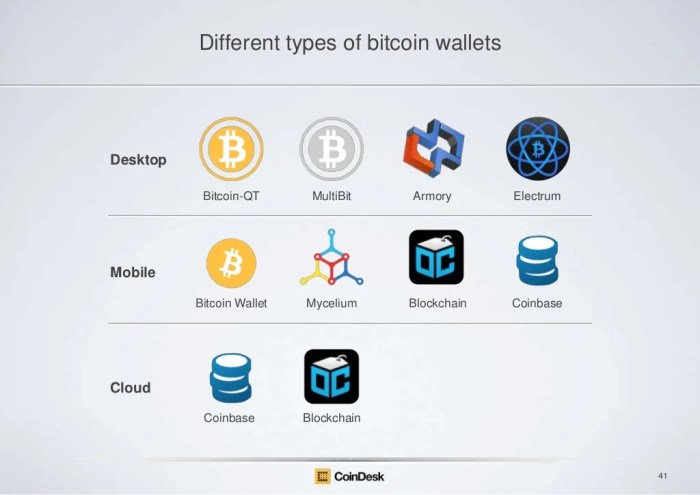
What Are Different Types of Bitcoin Wallets?
What are different types of Bitcoin wallets? This question is a crucial one for anyone venturing into the world of cryptocurrencies. Bitcoin wallets are the key to accessing and managing your digital assets, and understanding the different types is essential for making informed decisions about security and convenience.
From software to hardware, web-based to paper, each type of Bitcoin wallet offers a unique set of features and benefits, catering to different user needs and preferences.
The fundamental purpose of a Bitcoin wallet is to store and manage your private keys, which are the secret codes that grant you access to your Bitcoin. These private keys are linked to public keys, which are essentially your Bitcoin addresses, used for receiving and sending transactions.
Choosing the right type of Bitcoin wallet depends on factors like your level of technical expertise, security concerns, and how often you plan to use your Bitcoin.
Introduction to Bitcoin Wallets

A Bitcoin wallet is a software program that allows you to store, send, and receive Bitcoins. It is not a physical wallet like a traditional one, but rather a digital interface that manages your Bitcoin holdings. Imagine it as a digital key to your Bitcoin assets.
Public and Private Keys
Bitcoin wallets operate based on a pair of cryptographic keys: a public key and a private key. These keys are essential for secure Bitcoin transactions.
- Public Key:This key is a unique identifier for your Bitcoin wallet. It is like your Bitcoin address, which you can share with others to receive payments. This key is derived from your private key using cryptographic algorithms and is publicly available.
- Private Key:This key is a secret code that gives you control over your Bitcoins. It is essential for signing transactions and proving ownership of your Bitcoin holdings. You should never share your private key with anyone, as anyone with access to it can steal your Bitcoins.
Relationship Between Bitcoin Wallets and Bitcoin Addresses
Your Bitcoin wallet generates a unique Bitcoin address for each transaction. This address is derived from your public key and is used to receive Bitcoins. While you can have multiple Bitcoin addresses associated with your wallet, each address is linked to your unique public key, and ultimately, your private key.
“A Bitcoin wallet is essentially a software program that manages your private keys and allows you to interact with the Bitcoin blockchain.”
Types of Bitcoin Wallets
Bitcoin wallets are essential for storing, managing, and transacting Bitcoin. They act as a secure container for your private keys, which grant you access to your Bitcoin holdings. Choosing the right type of wallet depends on your specific needs, security preferences, and level of technical expertise.
Types of Bitcoin Wallets
Bitcoin wallets can be broadly categorized into four main types:
| Type | Description | Advantages | Disadvantages |
|---|---|---|---|
| Software wallets | Software wallets are applications installed on your computer or mobile device. They provide a user-friendly interface for managing your Bitcoin. | Convenient, accessible, and typically free to use. | May be vulnerable to malware and security breaches if not properly secured. |
| Hardware wallets | Hardware wallets are physical devices that store your private keys offline, providing a high level of security. | Highly secure, as private keys are stored offline and protected from online threats. | Can be more expensive than other wallet types and may require a physical device to access your funds. |
| Web wallets | Web wallets are online services that allow you to access your Bitcoin from any device with an internet connection. | Accessible from any device, easy to use, and often offer additional features like exchange integration. | May be less secure than other wallet types, as your private keys are stored on a server controlled by the wallet provider. |
| Paper wallets | Paper wallets are physical pieces of paper that contain your public and private keys, printed as QR codes. | Extremely secure, as your private keys are stored offline and physically protected. | Not very practical for frequent transactions and require careful storage and handling. |
Software Wallets
Software wallets are digital applications that store your Bitcoin private keys on your device. They offer convenience and accessibility, allowing you to manage your Bitcoin from your computer, smartphone, or tablet. However, it’s crucial to prioritize security measures when using software wallets.
Desktop Wallets
Desktop wallets are software applications that you install on your computer. They offer a higher level of security compared to mobile wallets because they are less susceptible to malware and hacking attempts. However, they are less portable and may require more technical knowledge to set up and use.
Pros of Desktop Wallets
- Enhanced Security:Desktop wallets are generally considered more secure than mobile wallets due to their isolated environment and less exposure to malware.
- More Features:Desktop wallets often provide more advanced features, such as cold storage capabilities, multi-signature transactions, and advanced security settings.
- Greater Control:Desktop wallets offer greater control over your private keys and transaction processes.
Cons of Desktop Wallets
- Less Portability:Desktop wallets are not as portable as mobile wallets, requiring you to access your Bitcoin from your computer.
- Technical Expertise:Desktop wallets may require more technical knowledge to set up and use.
- Vulnerability to Hardware Failure:If your computer fails, you may lose access to your Bitcoin unless you have a backup of your private keys.
Examples of Popular Desktop Wallets
- Electrum:A popular open-source desktop wallet known for its security and ease of use.
- Exodus:A user-friendly desktop wallet with a clean interface and support for multiple cryptocurrencies.
- Coinomi:A desktop wallet that prioritizes privacy and supports a wide range of cryptocurrencies.
Mobile Wallets
Mobile wallets are software applications that you install on your smartphone or tablet. They offer convenience and portability, allowing you to access your Bitcoin from anywhere with an internet connection. However, they are more vulnerable to malware and hacking attempts than desktop wallets.
Pros of Mobile Wallets
- Portability:Mobile wallets allow you to access your Bitcoin from anywhere with an internet connection.
- Ease of Use:Mobile wallets are generally easy to set up and use, making them accessible to a wider audience.
- Convenience:Mobile wallets allow you to make quick and easy Bitcoin transactions on the go.
Cons of Mobile Wallets
- Security Risks:Mobile wallets are more vulnerable to malware and hacking attempts due to the nature of mobile operating systems.
- Limited Features:Mobile wallets often offer fewer features than desktop wallets, such as advanced security settings and cold storage capabilities.
- Dependence on Device:If you lose or damage your mobile device, you may lose access to your Bitcoin unless you have a backup of your private keys.
Examples of Popular Mobile Wallets
- Blockchain.com Wallet:A popular mobile wallet with a user-friendly interface and support for multiple cryptocurrencies.
- Coinbase Wallet:A mobile wallet that offers a secure and convenient way to manage your Bitcoin.
- Mycelium:A mobile wallet known for its privacy features and advanced security settings.
Security Considerations for Software Wallets
Software wallets, both desktop and mobile, require careful attention to security to protect your Bitcoin. Here are some important considerations:
1. Choose a Reputable Wallet Provider
- Select a wallet provider with a strong reputation for security and reliability.
- Research the wallet’s security features, track record, and user reviews.
- Avoid using wallets from unknown or untrusted sources.
2. Secure Your Device
- Enable strong passwords and two-factor authentication on your computer and mobile device.
- Install reputable antivirus and anti-malware software to protect against threats.
- Keep your operating system and wallet software up to date with the latest security patches.
3. Back Up Your Private Keys
- Create multiple backups of your private keys and store them in secure, offline locations.
- Consider using a hardware wallet or a paper wallet for offline storage of your private keys.
- Never share your private keys with anyone, and be wary of phishing attempts.
4. Be Aware of Phishing Scams
- Be cautious of suspicious emails, websites, or messages that ask for your private keys or personal information.
- Always verify the authenticity of any communication before providing sensitive information.
- Report any suspicious activity to the wallet provider or relevant authorities.
Hardware Wallets

Hardware wallets are physical devices designed to store and secure your Bitcoin private keys. They offer an extra layer of security compared to software wallets, making them a popular choice for long-term Bitcoin storage.
Functionality and Security Features
Hardware wallets work by generating and storing your Bitcoin private keys offline, within a secure chip. This isolation from the internet makes them highly resistant to hacking and malware. These devices typically feature a small screen and buttons for navigating menus and confirming transactions.
Protecting Private Keys
Hardware wallets protect your private keys by keeping them completely offline. They use a combination of physical security and cryptographic techniques to ensure your keys remain safe.
Offline Storage
Figuring out which type of Bitcoin wallet is right for you can feel like navigating a fancy restaurant menu. You’ve got your hardware wallets, offering the highest security, then there’s the convenience of mobile wallets, and even the option of web wallets for quick access.
But just like the menu trailer asks what if fine dining was really a horror movie , there’s a certain level of trust involved. Choosing the right wallet for your needs is key to safeguarding your digital assets.
The private keys are stored within the hardware wallet’s secure chip, which is physically isolated from the internet. This prevents hackers from accessing your keys remotely.
Secure Chip
The secure chip within the hardware wallet is designed to resist tampering and unauthorized access. It uses advanced cryptographic algorithms to protect your keys.
PIN Protection
Choosing the right Bitcoin wallet is crucial, just like picking the right pair of aviator sunglasses. There are hot wallets, cold wallets, and even hardware wallets, each offering different levels of security and accessibility. It’s important to consider your needs and choose the wallet that best suits you, just like how the return of aviator joe has brought back a classic style.
With so many options available, you’re sure to find the perfect wallet to store and manage your Bitcoin securely.
Many hardware wallets require a PIN code to access your private keys, providing an additional layer of security.
Seed Phrase Backup
Hardware wallets typically allow you to create a seed phrase, a list of words that acts as a backup for your private keys. This allows you to recover your Bitcoin if you lose your hardware wallet.
Examples of Hardware Wallet Manufacturers
Several reputable hardware wallet manufacturers offer secure and reliable products. Here are some of the most well-known options:
Ledger
Ledger is a leading hardware wallet manufacturer, known for its secure devices like the Ledger Nano S and Ledger Nano X.
Trezor
Trezor is another prominent hardware wallet manufacturer, known for its Trezor One and Trezor Model T devices.
KeepKey
KeepKey offers a high-quality hardware wallet with a large screen and easy-to-use interface.
Coldcard
Coldcard is a hardware wallet known for its security focus, featuring a completely air-gapped design that isolates it from the internet.These hardware wallets are designed to be secure and user-friendly, making them a good choice for storing and managing your Bitcoin safely.
Web Wallets
Web wallets are a convenient way to access your Bitcoin, allowing you to manage your funds directly from your web browser. They offer easy accessibility, making it simple to buy, sell, and trade Bitcoin without the need for additional software downloads.
However, it’s crucial to understand the security implications associated with this type of wallet.
Advantages and Disadvantages of Web Wallets
Web wallets present both advantages and disadvantages that users should consider before choosing this type of wallet.
- Advantages:
- Accessibility:Web wallets can be accessed from any device with an internet connection, making them highly convenient for users on the go.
- Ease of Use:They are typically user-friendly, with intuitive interfaces that simplify Bitcoin management.
- Integration with Exchanges:Many web wallets seamlessly integrate with popular cryptocurrency exchanges, facilitating easy buying and selling of Bitcoin.
- Disadvantages:
- Security Risks:Web wallets are vulnerable to hacking and phishing attacks, as your private keys are stored online, making them susceptible to compromise.
- Custodial Control:Some web wallets are custodial, meaning the platform holds your private keys, giving them control over your Bitcoin. This can raise concerns about security and potential loss of funds in case of platform failure or fraud.
- Limited Control:Users may have limited control over advanced features, such as creating custom transaction fees or using specific Bitcoin network settings.
Custodial and Non-Custodial Web Wallets
Web wallets can be categorized into two main types: custodial and non-custodial. Understanding the difference is crucial for making informed decisions about security and control over your Bitcoin.
Custodial Web Wallets
Custodial web wallets are managed by a third-party service provider that holds your private keys. This means the service provider has control over your Bitcoin, and you rely on their security measures to protect your funds.
- Advantages:
- Ease of Use:Custodial wallets are typically user-friendly, requiring minimal technical knowledge.
- Customer Support:Users can rely on the service provider for support in case of issues or questions.
- Disadvantages:
- Security Risks:If the service provider is compromised, your Bitcoin could be stolen.
- Loss of Control:You relinquish control over your private keys, making you dependent on the service provider.
- Potential for Fraud:There is a risk of the service provider engaging in fraudulent activities, such as running away with user funds.
Non-Custodial Web Wallets
Non-custodial web wallets give you full control over your private keys, meaning you are solely responsible for their security. These wallets typically use a mechanism called “multi-signature” or “threshold cryptography” to ensure that multiple parties need to sign a transaction before it is executed.
- Advantages:
- Enhanced Security:Non-custodial wallets offer greater security as you retain control of your private keys.
- Privacy:You have more control over your transactions and can maintain greater privacy.
- Disadvantages:
- Technical Complexity:Non-custodial wallets require a higher level of technical understanding to manage private keys securely.
- Risk of Loss:If you lose your private keys, you will lose access to your Bitcoin permanently.
Reputable Web Wallet Services
Several reputable web wallet services offer both custodial and non-custodial options. Some popular examples include:
- Coinbase:A popular custodial web wallet service with a user-friendly interface and extensive features, including buying, selling, and trading Bitcoin.
- Blockchain.com:Another popular custodial web wallet service known for its simplicity and security features.
- Exodus:A non-custodial web wallet that prioritizes privacy and security. It supports multiple cryptocurrencies and offers advanced features like hardware wallet integration.
- Mycelium:A non-custodial web wallet focused on security and privacy, known for its strong encryption and advanced features.
Paper Wallets
Paper wallets are a type of offline Bitcoin wallet that stores your private keys on a piece of paper. They are considered a highly secure method of storing your Bitcoin because they are not connected to the internet and are therefore not susceptible to hacking or malware.Paper wallets are a popular choice for those who value security and privacy.
They are also a good option for long-term storage, as they are not susceptible to the same risks as online wallets.
Creating a Paper Wallet
To create a paper wallet, you will need to use a paper wallet generator. There are many different paper wallet generators available online, but it is important to choose a reputable one. Once you have chosen a generator, you will need to follow the instructions provided.
This will typically involve entering your desired amount of Bitcoin and then downloading a PDF file that contains your private keys.The process of creating a paper wallet is relatively simple. You can use a paper wallet generator to generate a pair of keys: a public key and a private key.
The public key is used to receive Bitcoin, while the private key is used to authorize transactions. The private key is the most important part of a paper wallet, and it should be kept safe and secure.Once you have generated your keys, you can print them out on a piece of paper.
It is important to print your keys on high-quality paper and to store them in a safe and secure location.
Security Benefits of Paper Wallets
Paper wallets offer several security benefits:* Offline Storage:Paper wallets are not connected to the internet, making them immune to hacking and malware.
No Software Dependencies
You don’t need to rely on any software or third-party services to access your funds.
Physical Security
As long as you keep your paper wallet safe, your Bitcoin is secure.
Limitations of Paper Wallets
Paper wallets also have some limitations:* Loss or Damage:If you lose or damage your paper wallet, you will lose access to your Bitcoin.
When it comes to Bitcoin wallets, you’ve got options – software wallets, hardware wallets, and even paper wallets. Each has its pros and cons, but choosing the right one depends on your level of security and comfort with technology. However, security concerns extend beyond digital assets; understanding global threats like the rise of Islamism, as explored in this article on why islamism will continue to threaten liberal democracies in europe , is equally important.
Back to Bitcoin, if you’re looking for the most secure option, a hardware wallet is a great choice, offering offline storage for your crypto.
Difficult to Use
Paper wallets can be difficult to use for frequent transactions.
Security Risks
If your paper wallet is stolen or compromised, your Bitcoin could be stolen.
Storing and Managing a Paper Wallet Securely
It is important to store and manage your paper wallet securely to protect your Bitcoin:* Store in a Safe Place:Keep your paper wallet in a safe place, such as a safe deposit box or a fireproof safe.
Multiple Copies
Create multiple copies of your paper wallet and store them in different locations.
Backup
Make sure to create a backup of your paper wallet and store it in a secure location.
Destroy Old Copies
When you create a new paper wallet, destroy all old copies.
Choosing the Right Bitcoin Wallet
Navigating the world of Bitcoin wallets can be overwhelming, with various options catering to different needs and preferences. Choosing the right wallet is crucial for safeguarding your Bitcoin, ensuring ease of use, and accessing the features you require.
Factors to Consider When Selecting a Bitcoin Wallet
Selecting the right Bitcoin wallet requires careful consideration of several factors. This ensures you choose a wallet that aligns with your security needs, user experience preferences, and desired functionality.
- Security:Security is paramount when it comes to Bitcoin wallets. Consider factors like multi-signature support, two-factor authentication (2FA), and the wallet’s reputation for security. Some wallets offer additional security features like cold storage or hardware wallets, which physically store your private keys offline.
- User-Friendliness:A user-friendly interface is essential, especially for beginners. Choose a wallet that is intuitive, easy to navigate, and offers clear instructions. Some wallets provide excellent educational resources and support documentation to help users understand the basics of Bitcoin and wallet management.
- Functionality:Different wallets offer varying levels of functionality. Consider features like sending and receiving Bitcoin, exchanging Bitcoin for other cryptocurrencies, and integrating with other platforms. Some wallets offer advanced features like decentralized finance (DeFi) integration, which allows users to access various financial services directly from their wallet.
- Platform Compatibility:Choose a wallet compatible with your preferred devices. Some wallets are available as mobile apps, desktop software, or web-based platforms. Ensure the wallet supports your operating system and preferred device.
- Fees:Be aware of the fees associated with using a particular wallet. Fees can vary depending on the wallet provider, transaction size, and network congestion. Compare fees between different wallets to find the most cost-effective option.
- Privacy:Consider your privacy preferences. Some wallets offer more privacy features than others. For example, some wallets use privacy-enhancing technologies like CoinJoin, which mixes your transactions with others to obscure your identity.
- Customer Support:Reliable customer support is essential, especially if you encounter any issues. Choose a wallet with responsive and helpful customer support channels.
Security Best Practices for Bitcoin Wallets
Securing your Bitcoin wallet is paramount to safeguarding your digital assets. It’s crucial to understand that while Bitcoin itself is secure due to its decentralized nature, your wallet is the entry point for accessing your funds. Therefore, implementing strong security measures is essential to protect your investments from theft or loss.
Strong Passwords and Secure Storage
A robust password is the first line of defense against unauthorized access to your wallet. Avoid common or easily guessable passwords. Instead, opt for a combination of uppercase and lowercase letters, numbers, and symbols. Additionally, consider using a password manager to generate and store complex passwords securely.
- Avoid using the same password for multiple accounts. This minimizes the risk of compromise if one account is compromised.
- Enable two-factor authentication (2FA)wherever possible. This adds an extra layer of security by requiring a second authentication factor, typically a code sent to your mobile device, in addition to your password.
- Store your wallet backup securely. Your wallet backup contains the necessary information to recover your funds in case of device loss or damage. Store it in a safe place, ideally offline, and never share it with anyone.
Multi-Factor Authentication (MFA)
Multi-factor authentication (MFA) significantly enhances your wallet’s security by requiring more than one form of identification before granting access. It adds an extra layer of protection, making it significantly harder for unauthorized individuals to gain access to your funds.
This method typically involves using a combination of something you know (password), something you have (phone), and something you are (biometrics).
- Implement MFA on your exchange accounts. This helps protect your funds even if your exchange is compromised.
- Use a hardware wallet with MFA. This offers the highest level of security, as it requires both your physical possession of the hardware wallet and a secondary authentication factor.
Additional Security Measures
Beyond strong passwords and MFA, several other practices can bolster your wallet’s security:
- Keep your software updated. Software updates often include security patches that address vulnerabilities. Ensure your wallet software, operating system, and antivirus software are up-to-date.
- Be wary of phishing scams. Phishing scams attempt to trick you into revealing your wallet’s private keys or login credentials. Never click on suspicious links or provide your information on unverified websites.
- Use a reputable Bitcoin wallet provider. Choose a provider with a strong reputation for security and privacy.
Common Bitcoin Wallet Security Threats
Bitcoin wallets, while offering a revolutionary way to manage digital assets, are not immune to security threats. These threats can range from simple phishing scams to sophisticated malware attacks, all aimed at stealing your precious Bitcoin. Understanding these threats and implementing robust security measures is crucial to protecting your digital wealth.
Phishing Attacks
Phishing attacks are a common threat in the digital world, and Bitcoin wallets are no exception. Phishing attacks typically involve malicious actors sending emails, text messages, or social media messages that appear to be from legitimate sources, such as Bitcoin exchanges or wallet providers.
These messages often contain links that, when clicked, redirect users to fake websites designed to steal their login credentials, private keys, or other sensitive information. Here are some tips to protect yourself from phishing attacks:
- Be cautious of suspicious links:Always double-check the sender’s address and the link before clicking on it. If you’re unsure about a link, it’s best to err on the side of caution and avoid clicking it.
- Verify the website:Ensure you are on the official website of the Bitcoin exchange or wallet provider you are using. Look for the “https” prefix in the URL and a padlock icon in the address bar, indicating a secure connection.
- Don’t share your private keys:Never share your private keys with anyone, not even representatives of Bitcoin exchanges or wallet providers. Legitimate services will never ask for your private keys.
Malware
Malware is another significant threat to Bitcoin wallets. Malware can be installed on your computer or mobile device without your knowledge and can steal your Bitcoin by compromising your wallet’s security. Some malware can even record your keystrokes, capturing your private keys as you type them.Here are some tips to protect yourself from malware:
- Install antivirus software:Use a reputable antivirus software to scan your computer or mobile device regularly for malware.
- Keep your software updated:Ensure your operating system, antivirus software, and other software are up-to-date with the latest security patches.
- Be careful about downloads:Download software only from trusted sources, such as official websites or reputable app stores.
- Avoid suspicious websites:Do not visit websites that seem suspicious or that you don’t recognize.
Scams
Scams are a common way for malicious actors to trick people into giving up their Bitcoin. Scams can take many forms, including:
- Fake Bitcoin giveaways:These scams involve promises of free Bitcoin if you provide your personal information or send a small amount of Bitcoin to a specific address.
- Investment scams:These scams involve promises of high returns on Bitcoin investments, but the money is often lost or stolen.
- Romance scams:These scams involve people who pretend to be romantically interested in you to gain your trust and then ask for money.
Here are some tips to protect yourself from scams:
- Be skeptical:If something sounds too good to be true, it probably is. Be wary of offers that seem too good to be true, especially those involving Bitcoin.
- Do your research:Before investing in any Bitcoin-related product or service, research the company or individual involved. Look for reviews and testimonials from other users.
- Don’t give out your personal information:Never give out your personal information, such as your private keys, to anyone you don’t know or trust.
Real-World Security Incidents
There have been several high-profile security incidents involving Bitcoin wallets. For example, in 2017, the cryptocurrency exchange Mt. Gox was hacked, resulting in the theft of over 850,000 Bitcoin. This incident highlighted the importance of robust security measures, such as multi-factor authentication and cold storage.Another notable incident occurred in 2019 when the cryptocurrency exchange Binance was hacked, resulting in the theft of millions of dollars worth of Bitcoin.
This incident highlighted the importance of implementing strong security practices, such as regularly updating software and using strong passwords.
The Future of Bitcoin Wallets: What Are Different Types Of Bitcoin Wallets
The world of Bitcoin wallets is constantly evolving, driven by technological advancements and the growing adoption of cryptocurrencies. As the Bitcoin ecosystem matures, we can expect to see exciting developments in wallet security, usability, and functionality.
Emerging Trends in Bitcoin Wallet Technology
The future of Bitcoin wallets is brimming with innovation. Here are some of the emerging trends shaping the landscape:
- Multi-signature wallets:These wallets require multiple private keys to authorize transactions, enhancing security by adding an extra layer of protection against unauthorized access. For instance, a multi-signature wallet could require two out of three key holders to approve a transaction, making it much harder for hackers to steal funds.
- Decentralized wallets:These wallets are hosted on a decentralized network, eliminating the need for a central server. This approach offers enhanced privacy and security, as user data is not stored on a single point of failure. For example, a decentralized wallet might be hosted on a blockchain network, ensuring the integrity of transactions and the security of user funds.
- Mobile-first wallets:As smartphones become increasingly powerful, mobile wallets are becoming more sophisticated and user-friendly. These wallets are designed for convenience and accessibility, allowing users to manage their Bitcoin on the go.
- Integration with other services:Bitcoin wallets are increasingly integrating with other services, such as exchanges, payment processors, and even traditional financial institutions. This integration simplifies the process of buying, selling, and using Bitcoin, making it more accessible to a wider audience.
Potential Future Developments in Security
Security is paramount in the Bitcoin ecosystem. Here are some potential advancements in wallet security:
- Biometric authentication:Using fingerprint, facial recognition, or iris scanning technology to secure wallets will enhance security by making it more difficult for unauthorized individuals to access funds.
- Hardware security modules (HSMs):These physical devices store private keys securely, offering a robust defense against hacking attempts. HSMs are commonly used in high-security environments to protect sensitive data.
- Advanced encryption algorithms:As cryptography evolves, wallets will employ more sophisticated encryption algorithms to protect user data and private keys from unauthorized access.
- Zero-knowledge proofs (ZKPs):ZKPs enable users to prove their ownership of Bitcoin without revealing their private keys, enhancing privacy and security.
Potential Future Developments in Usability
Usability is crucial for the widespread adoption of Bitcoin. Here are some potential advancements in wallet usability:
- Simplified user interfaces:Wallets will become more intuitive and user-friendly, making it easier for even non-technical users to navigate and manage their Bitcoin.
- Improved transaction speed:Faster transaction speeds will enhance the user experience, reducing the time it takes to send and receive Bitcoin.
- Integration with everyday applications:Bitcoin wallets will seamlessly integrate with popular apps and services, allowing users to make payments and manage their Bitcoin without leaving their preferred platforms.
- Support for multiple cryptocurrencies:Wallets will support a wider range of cryptocurrencies, simplifying the management of diverse digital asset portfolios.
Potential Future Developments in Functionality
The functionality of Bitcoin wallets is continuously expanding. Here are some potential future developments:
- Smart contracts:Wallets will integrate with smart contracts, enabling automated transactions and other complex financial operations.
- Decentralized finance (DeFi):Wallets will facilitate access to decentralized finance applications, offering users a wider range of financial services.
- Non-fungible tokens (NFTs):Wallets will support NFTs, allowing users to store, manage, and trade these digital assets.
- Privacy-enhancing features:Wallets will incorporate features that enhance privacy, such as coin mixing and private transactions.
Impact of Advancements on the Bitcoin Ecosystem, What are different types of bitcoin wallets
These advancements in Bitcoin wallet technology will have a profound impact on the Bitcoin ecosystem. Here are some key impacts:
- Increased adoption:Improved security, usability, and functionality will make Bitcoin more accessible and user-friendly, driving wider adoption.
- Enhanced security:More secure wallets will reduce the risk of theft and fraud, building trust in the Bitcoin ecosystem.
- New use cases:Advanced functionality will open up new use cases for Bitcoin, enabling innovative applications and services.
- Growth of the DeFi ecosystem:Integration with DeFi applications will accelerate the growth of the decentralized finance ecosystem, offering users more financial opportunities.






